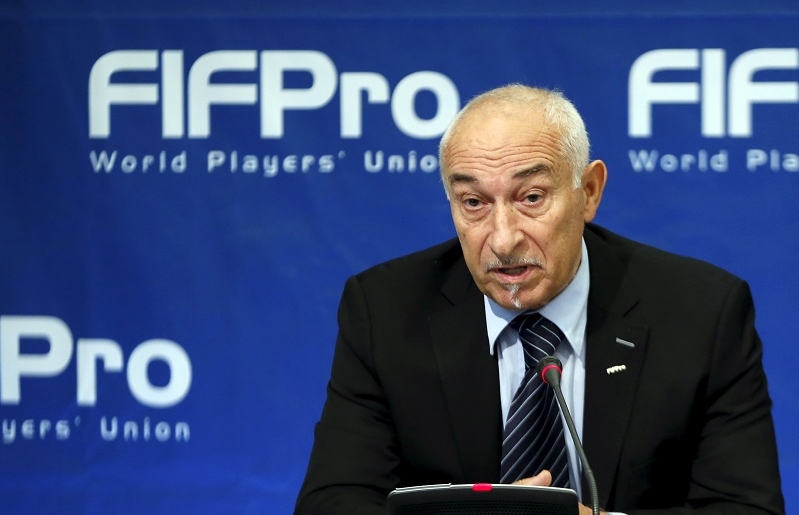
BRUSSELS (Reuters) - FIFPro's plans to dismantle the transfer system may sound far-fetched and possibly eccentric to the average fan but the world players' union says there is no other way to fix a sport which is losing its competitive edge.
Alarmed at the gap between the world's richest clubs and players in less glamorous leagues who scrape a living in what FIFPro president Philippe Piat describes as modern slavery, the union believes the transfer system needs a radical overhaul.
The transfer system, where players are traded between clubs for fees running into tens of millions of euros, is so deeply ingrained that it is hard to imagine the sport without it.
English Premier League clubs spent 870 million pounds ($1.36 billion) on players in the July-August transfer window, according to business advisory firm Deloitte.
But getting rid of transfers is exactly what FIFPro aims to achieve after lodging a complaint at the European Commission on Friday, arguing the system infringes European competition law.
FIFPro, which represents 65,000 players around the world, has several grievances against the system but the main one is that it has reduced the level of competition between clubs, effectively making the sport too predictable.
On a European level, only a small number of clubs from the biggest leagues, such as Barcelona, Real Madrid and Bayern Munich, can afford the astronomical fees for the world's top players. As a result, an elite dominates the Champions League.
It has also led to nearly all the world's top players becoming concentrated in a handful of leagues -- in England, Germany, France, Italy and Spain.
BALANCE NEEDED
Clubs such as Ajax Amsterdam and Benfica, once considered major forces in European football, have been reduced to the role of feeder clubs for the bigger leagues.
FIFPro says this needs to change.
"We believe that it is possible in smaller countries to have an attractive national competition and that balance has to be there, otherwise in a couple of years we will only have 30 clubs in the world, and nobody wants that," said FIFPro secretary-general Theo van Seggelen.
FIFPro says the dominant clubs entrench their position in the market by inflating transfer fees and therefore creating barriers against other clubs to compete with them.
"Transfer fees are effectively a tax on employment because they represent deterrents for possible employers to acquire employees' services," said FIFPro director Jonas Baer-Hoffmann.
Van Seggelen said that, because agents received a commission on transfer fees, there was an incentive for them to move players around as often as possible.
This leads to some players representing more than one dozen clubs, often in several different countries, in their careers.
"Why bring a 16-year-old South American to Europe? Because you want to exploit the player and you can make money out of this player," said Van Seggelen.
"I cannot imagine that a 16-year-old in Brazil really wants to leave his parents and go to a strange country where it's always raining."
NORMAL MARKET
FIFPro officials believe that without transfer fees football would turn into a normal labor market.
Players would have a better chance of finding clubs that suit their language, culture and level of ability because the transfer fee would no longer be the determining factor in whether a move went ahead, one FIFPro official told Reuters.
If agents' fees were based on a player's salary, rather than the transfer fee, they would have an incentive to find him the right club and keep him there.
Soccer's world governing body FIFA, which runs the transfer system through its Regulations on the Status and Transfers of Players (RSTP), did not return a request for comment.
European soccer's ruling body UEFA, which organizes the showpiece Champions League competition, hoped the matter could be settled outside the courts.
"Football and the solutions needed in football should be found by football people, and not the courts who have more important things to deal with than football-related matters," UEFA general secretary Gianni Infantino told reporters after a meeting in Malta.
However, Simon Chadwick, a professor of sports business strategy and marketing at Britain's Coventry University, said it could have the opposite effect to what FIFPro intended.
"If the EU prompts such a change then we will effectively be heading towards a free market for labor in the European Union," he said.
"As we know, the view is that markets regulate themselves, one consequence being that the rich get richer and the poor get poorer. Another view is that markets are unpredictable, hence the old certainties many in football are used to could disappear.
"Together, in the short to medium-term, these factors could mean that we have significant transfer instability and a growth in the strength of more powerful clubs and players."
Van Seggelen, however, said FIFPro had thought through the potential consequences. "We are not going to abolish the system and wait and see, we need to have a package of measures which safeguard the future," he said.
($1 = 0.6417 pounds)
(Reporting by Brian Homewood; Editing by Ken Ferris)







